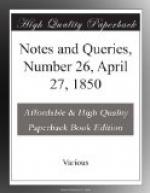“Fluminei veluti deprensus gurgitis
undis,
Avulsa parte inguinibus caussaque
pericli,
Enatat intento praedae fibor
avius hoste.”
Punica, IV. 485-8, where see Ruperti.
The scholiast on Juvenal, xii. 34., has the low Latin vebrus. (See Forcellini, Lex. in Fiber et Castor, Ducange in Bever, and Adelung in Biber.) Derivations of the word bebrus occur in all the languages of Europe, both Romanic and Teutonic; and denote the Castor. Beaver, in the sense of a hat or cap, is a secondary application, derived from the material of which the hat or cap was made.
W.
Poins and Bardolph (No. 24. p. 385.)—Mr. Collier (Life prefixed to the edit. of Shakspeare, p. 139.) was the first to notice that Bardolph, Fluellen, and Awdrey, were names of persons living at Stratford in the lifetime of the poet; and Mr. Halliwell (Life of Shakspeare, pp. 126-7) has carried the subject still further, and shown that the names of ten characters in the plays are also found in the early records of that town. Poins was, I believe, a common Welsh name.
S.
God tempers the Wind (No. 22. p. 357.)—Le Roux de Liney, Livre des Proverbes Francais (Paris, 1842), tom. i. p. 11., cites the following proverbs—
“Dieu mesure le froid a la brebis
tondue,
ou,
Dieu donne le froid selon la robbe,”
from Henri Estienne, Premices, &c., p. 47., a collection of proverbs published in 1594. He also quotes from Gabriel Meurier, Tresor des Sentences, of the sixteenth century:—
“Dieu aide les mal vestus.”
SIWEL.
April 5. 1850.
Sterne’s Koran (No. 14. p. 216.)—An inquiry respecting this work appeared in the Gent. Mag., vol. lxvii. pt. ii. p. 565.; and at p. 755. we are told by a writer under the signature of “Normanus,” that in his edition of Sterne, printed at Dublin, 1775, 5 vols. 12mo., the Koran was placed at the end, the editor honestly confessing that it was not the production of Sterne, but of Mr. Richard Griffith (son of Mrs. Griffith, the Novellettist), then a gentleman of large fortune seated at Millecent, co. Kildare, and married to a daughter of the late Ld. C.B. Burgh.
I possess a copy of an indifferent edition of Sterne’s works, in point of paper and type, “Printed for J. Mozley, Gainsbrough, 1795. 8 vols. 12mo.” The Koran is in the sixth vol., termed “The Posthumous Works of L. Sterne,” dedicated to the Earl of Charlemont by the editor, who, in his address to the reader, professes to have received the MS. from the hands of the author some time before his untimely death.
This I hope will answer the Query of “E.L.N.:” and at the same time I wish to express my regret, that we do not possess a really good and complete edition of Sterne’s Works, with a Life and literary history of them, incorporating the amusing illustrations by Dr. Ferriar.




